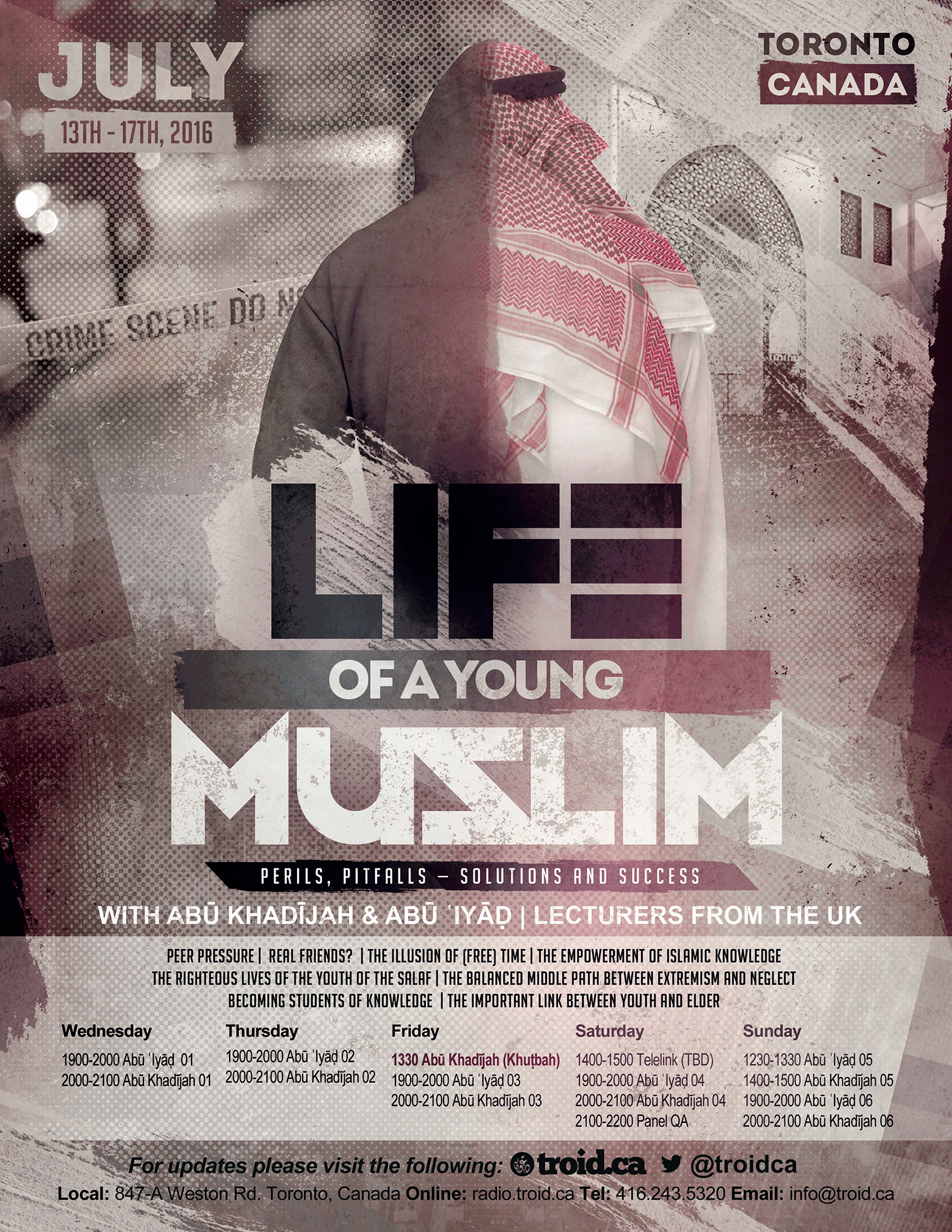Abū Khadījah delivers a series of eye-opening lectures on how to establish an Islamic home, reminding us of Allāh’s command to save ourselves and our families from the Hellfire. Each lecture is brimming with practical advice on how to ensure that our children grow up with a solid foundation of knowing and practicing this blessed dīn.
Part One
Start at the Beginning
The first and most important step in establishing an Islamic home is choosing a righteous spouse. Choose a spouse who is strong in his/her dīn, one who is united with you upon Salafiyyah. Next, teach your children good manners. Teach them how to survive in this environment of open sinning and open immorality, where every form of sin and evil is made permissible. Teach your family righteousness. The best example and role model for us is the Prophet (ṣallallāhu ʿalayhi wa-sallam). He survived the harsh environment of Makkah, enduring the harshness and immorality of the people there. We live in a similar environment so make the dīn the most important part of your life and your children’s lives.
Part Two
Keep Your Eyes on the Ākirah
In these times and in this environment (of Western countries), people don’t think about the hereafter. This society, with its glitter and shine, makes us forget about the Day of Judgement. We are duped into selling our ākhirah for the cheapness of this world. But on the Day of Judgement, there will be so much terror that parents will not benefit their children and children will not benefit their parents because people will only be concerned about themselves. Just one dip in the Hellfire and one would give anything to be saved from it. Many of the youth waste their time chasing wealth, status, women etc. Parents, you are a shepherd over your flock; do not leave them so that the lion can devour them. Parents, educators, keep your eyes on the ākhirah so you can teach your children and your youth to do the same. Youth, take the advice and education you have been given and live for the hereafter not for the instant gratification of desires that this temporary life offers.
Part Three
Take Your Amānah Seriously
Allāh gives great significance to the upbringing of the youth. He places tremendous responsibility on parents and guardians. So parents/guardians, pay attention to what comes into your home. Keep it free of things with little or no benefits, such as the internet and the television. Remember that the youth are your inheritors; If they are righteous and pious, they will be an extension of the life of their parents and they will be a pillar of strength for the daʿwah. The Prophet (ṣallallāhu ʿalayhi wa-sallam) said, “When the son of Adam dies all of his deeds will be lost except three” – the third one being a righteous child who makes duʿā for his dead parents. So parents/guardians emulate the Salaf in how they nurtured and cultivated their children. Ensure that your children grow up with good habits and firm grounding on the correct understanding of the dīn. Parents/guardians, take your amānah seriously!
Part Four
Be Aware of the Stages of a Child’s Development
One of the Salaf mentioned the stages of raising children; each stage lasts seven years:
0-7 – Parents play with their child and continually show him/her mercy.
7-14 – The child is taught good manners and good conduct. He/she is taught how to behave in front of adults. He/she should be taught the Qurʿān and how to pray. At this stage, the child is easily influenced so parents should spend time teaching them.
14-21 – The young man/woman should share responsibilities in the home. They should be sent to Salafi teachers who can teach them their dīn and protect them from the callers at the gate of the Hellfire that the Prophet (ṣallallāhu ʿalayhi wa–sallam) warned us about, such as the Khawārij. Have your child with you in the masjid attending classes so they can truly understand what education is all about. Protect them from evil influences. At this stage, the child should be very close to his/her parents, accompanying them and seeking their counsel.
Part Five
Teach Your Children Good From Evil
Hudayfah (raḥimahullāh) said that while the people were asking the Messenger of Allāh (ṣallallāhu ʿalayhi wa-sallam) about the good things, he asked about the bad things. He wanted to know about the evil so he could recognize it and stay away from it. So teach your children about the evil so they will recognize it and stay away from it. Teach them about the evils of the Khawārij and the evils of bidʿah and counterbalancing so they can stay away from them. Remember that the Khawārij targets the youth with emotions because they know that the youth are energetic and hasty. So cultivate your youth with the sunnah and keep them with the Salafis. Teach them the good so they know goodness and love it, teach them about evil so they will recognize it and hate it.
Part Six
In the Prophet (ṣallallāhu ʿalayhi wa–sallam) Is a Fine Example
Teach the children about the character of the Prophet (ṣallallāhu ʿalayhi wa-sallam). Teach them about his bravery, courage, and generosity. He was the best husband, the best father, the best friend. Make them KNOW him. If they know him they will love him and will want to emulate him. So use him as a role model for yourself and your children. For he (ṣallallāhu ʿalayhi wa-sallam) said, “I came to perfect the good character.”
The series ends with some Q & A on the topic.












